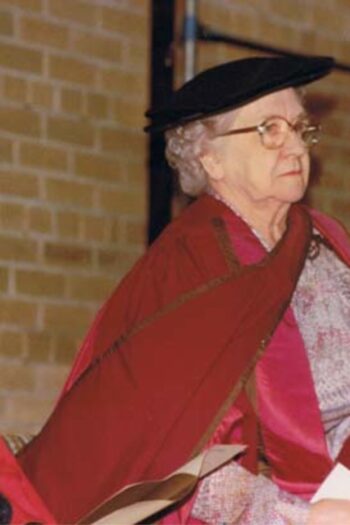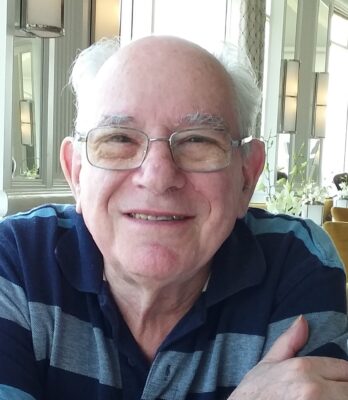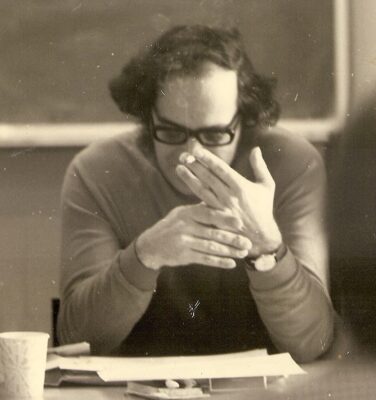Short in stature, strong of constitution (she lived to the age of 101), brilliant of mind and distinctively Scottish, Anna Hogg’s name is invoked annually in a ceremonial Oration by the Australian College of Educators (ACE) of which she was a Foundation Member in 1959. But she was also a Foundation Member of PESA, yet her name is hardly known and rarely heard of anywhere in that particular context.[1]
The fact that she did not attend Annual Conferences or a single Branch Meeting may have something to do with it. Perhaps more relevant was that she chose to retire, characteristically unheralded, in 1973; and, although she was a brilliant philosopher with a long bibliography, her absence from the pages of EPAT may also have kept her from the attention of PESA members. And yet I believe that it could be argued that there might never have been a PESA had it not been for this remarkable woman.
Anna’s lifetime was marked by a series of distinguished achievements which, taken together, put her right at the forefront of the development of educational studies in twentieth-century Australia. These are detailed in the Annuls of the ACE: here, I can quickly mention two and look a bit more closely at a third – the birth of PESA.
The first was the aforementioned fact that she was a Foundation Member (1959) of the Australian College of Educators. This gave her form in working collegially to bring learned Societies into being – form she was able to draw on in 1968-1969 with regard to PESA. The second was her Editorship of the Journal of Christian Education in the 1960s. Through this position, Anna, a deeply devout Christian, found herself at the centre of Christian academic debate on education, and thus in very close personal and intellectual contact with the likes of Bill Andersen, Brian Hill, a young Jim Walker and many others who trod the campus of Thomas More College or made submissions from beyond, including New Zealand (think Ivan Snook).
But Anna’s main influence on PESA came through her position as Head of the Department of Teacher Education at Sydney Teachers College from 1948-1973, most especially in the last six years of that reign. To understand this better, a little history and geography might help.
Sydney Teachers College (STC) was a massive building which stood (and still stands) within the grounds of Sydney University (SU), mere metres down the hill from SU’s then School of Education, and historically the Professor of Education at SU was ex officio the Principal of STC. That relationship progressively deteriorated[2], but an important connection remained. Apart from providing two-year courses in Teacher Training for its own students – non-graduate aspiring Primary and Junior Secondary teachers – STC remained responsible for the one-year Diploma in Education for those graduates of SU who sought to become High School teachers, most of whom had studied not a jot of education in their undergraduate years. Both courses, taught by the same staff, were ridiculously inadequate, and the DipEd, heavily focused on ‘teaching method’ and practice teaching, was treated with almost universal derision by both SU staff and students. The SU graduates often looked on it as a ‘gap year’ with minimal attendance and cursorily completed assignments, while the STC staff – heavy on past teaching experience but light on academic qualifications – focused on practice, and many genuinely feared the presence of a Philosophy Major in their class or the possibility of any serious discussion breaking out. All of that suited the huge loud-talking heavy drinking 2IC of the Department and the coterie of male followers who accompanied him on daily long lunches at the Forest Lodge Hotel. It did not suit Anna.
Anna believed in a different role for initial teacher education; one that not merely equipped the person for the classroom experience but one which developed in the future teacher a sound knowledge of the psychology of the learner, an understanding of the social implications and context of teaching, and a deeper understanding of what education – its content, method and social context – meant in the broadest sense of producing the ‘educated person’ and the good society. She had few allies and well-organised opposition from her 2i/c who coveted and continually undermined her position, but she was a very, very strong woman, and, in the early 1960s, she knew that she had to make her stand.
Her first move was to take a sabbatical and study with Richard Peters at the University of London Institute of Education. It was an intellectually inverted exchange, but Anna did learn two things – what this new-fangled ‘philosophy of education’ was all about, and how Peters had embedded it into courses in a manner whereby students simply had to encounter it. She also learnt about the workings of the PESGB, and got some clues as to how to attain staff, but, on return to Australia, she was hampered in this particular aspect by not having the freedom to make appointments on particular disciplinary merit. Nevertheless, she shared her experience with her very close colleague up the hill at SU, Bill Andersen, and he too, inspired by Anna, made the pilgrimage to London. He returned equally as excited, particularly about the PESGB, and, as the newly appointed Director of Postgraduate Studies in the School of Education, he had the added benefit of being able to make appointments on merit in open competition rather than on seniority from among practising teachers. Warren Fenley and Peter Stevens were suddenly in the frame, with David Hogan and others close by.
Anna then inserted herself into the DipEd course as a teacher and took the liberty of encouraging graduates with a background in philosophy to join special advanced non-credit classes. Enter DipEd student Michael Matthews, who described the experience in Educational Philosophy and Theory as:
close to Paul on the Damascus Road. For the first time, I was introduced to a coherent sense of the educational enterprise … something intimately linked to reason, understanding and rationality; something directed to ethical ends and that was to be conducted in a moral manner.
Within a short time, Anna was to have Michael back as a Lecturer in Education.
Anna’s next move was to gather what numbers she could. First came Keith Foster, who was not strictly a philosopher but rather a most friendly traveller. She then continued to liaise closely with Bill Andersen to learn of the ‘talent’ he was drawing to his courses, and, in 1968, she had drawn Jim Walker to the College (although not in a full teaching position), and the following year she intervened heavily to get me appointed – as a lecturer in Sociology on the books if not exactly so in the classroom. Then came 1968-1969: the years Anna and Bill, along with Les Brown and some minor players, formed the Foundation Committee of what was to become PESA.
That could have been Anna’s crowning glory, but one more opportunity opened up for her. The State Government finally realised the inadequacy of two-year teacher training courses and decreed that they become three-year courses. To this end, Anna organised, chaired and coordinated a number of large Committees which mapped out the structure and detail of the new course for STC, and there now being a whole year’s space to fill and far more support than before, a place was more easily found for a new subject. To the chagrin of the loud-voiced 2IC, Philosophy of Education got a one-semester two-hour per week slot. Anna and I devised the detail, and the following year I taught the first official Philosophy of Education course at STC. At the end of 1973, Anna retired, her missions at STC and with philosophy of education and PESA fulfilled.
Is all of this sufficient to infer that, if not for Anna, there may not have been a PESA? Of course, this is an impossible hypothetical, but it’s worth considering.
At a micro level, we can reasonably speculate on whether, if not for Anna, Jim Walker would have followed his first love – philosophy – and never have come to Education; whether Michael Matthews would have found his ‘Road to Damascus’ leading elsewhere; whether had not Anna personally intervened to facilitate my employment at STC, I would have taken up my offer of a Lectureship in English at a country University and have fled the whole scene forever; and if not for Anna’s ‘Christian connection’ whether hands would have reached out across the Tasman to Ivan Snook.
At a broader level, we can consider whether, given the strong resistance, if not for Anna, there would ever have been courses in Philosophy of Education at STC to attract future academics to the discipline and PESA (Marjorie O’Laughlin and John Roe spring to mind, but there were a great many more) and to offer the discipline itself to future generations of teachers.
But the biggest question remains. Bill Andersen was undoubtedly the driving force in the establishment of PESA, and he got his inspiration from his experience in London with Richard Peters and the PESGB. Bill told me often that, if not for Anna, he would not have made that journey. Given the risk of running into a regression,[3] I believe we can conclude with certainty that PESA’s existence owes far more to Dr Anna Hogg than has commonly been recognised.
[1] Staff at NSW Teachers Colleges were not academic appointments but rather ‘placements’ by the Public Service Board, almost always from the ranks of NSW schoolteachers. Thus, few had Masters Degrees and scarcely any had PhDs. It was standard practice to address those who did hold Doctorates with that Honorific. Old habits die hard.
[2] This reached the ultimate absurdity when, notwithstanding that STC stood fully enclosed within the grounds of SU, it was given the Postcode (or Zip Code) of a neighbouring suburb rather than the University’s 2006.
[3] Of course, without her parents there would have been no Anna, and so on. One must be so wary in the company of philosophers.




